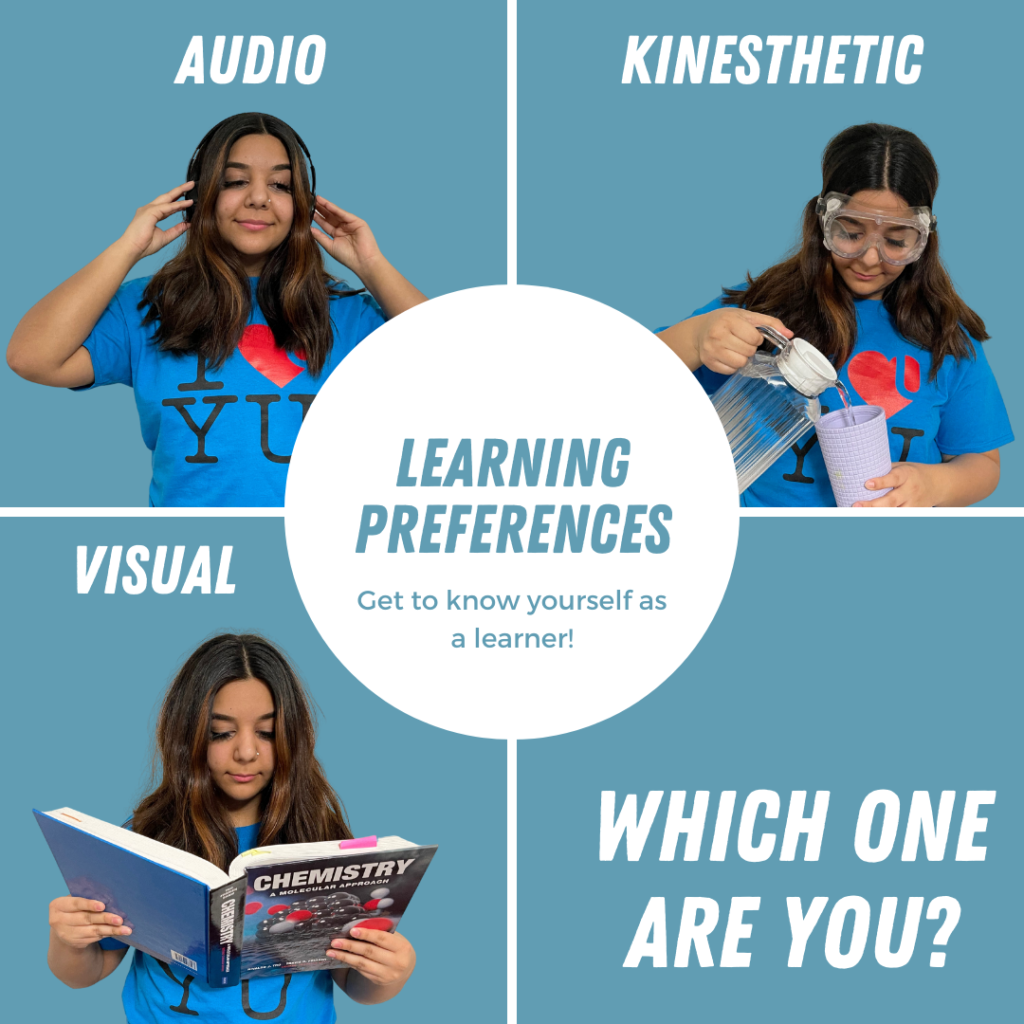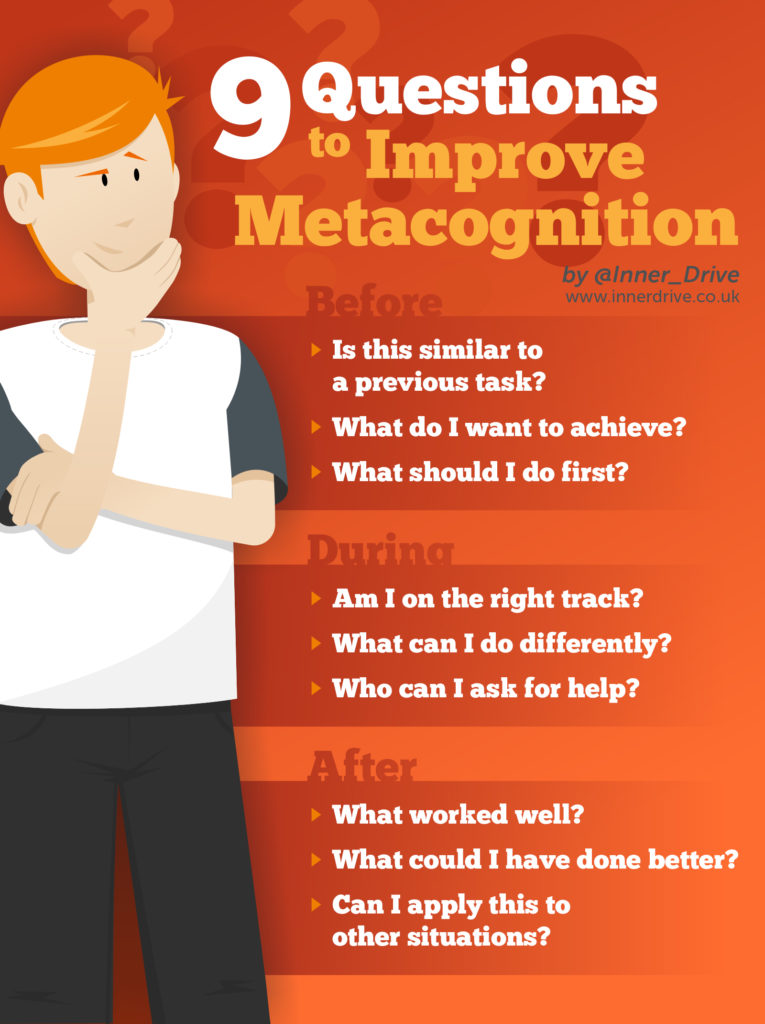
Get to Know Yourself as a Learner
As you get to know yourself as a learner, you will build up your own toolkit of strategies for learning. Here are some things to consider in getting to know your learning preferences:
- What is at least one thing that you really really enjoyed learning?
- What did you find enjoyable and rewarding about that learning experience?
- What is at least one thing that you are good at? How can you use that skills/ability to help you succeed in university?

Learning How to Learn
You can use metacognition to learn how YOU personally learn best.
Plan & Organize - Review the instructions and outcomes for your assignment and use these to help you make a plan. Set goals and divide large tasks into smaller pieces.
Monitor Your Progress - Monitor how well your plan is working for you. Are you meeting your goals? Are the study strategies that you are using helping you to understand the material?
Direct Your Own Learning - Identify your motivations for learning and tap into them to help keep your energy going. Set-up a study space and schedule that works best for you.
Self-Reflect & Evaluate - When the assignment is complete, reflect on how well the process went and your satisfaction the outcome. Think about how to apply what you have learned about how you learn best to your next plan.
10 Rules of Good Studying
- Recall: After you read a page, look away and recall the main ideas. An ability to recall—to generate the ideas from inside yourself—is one of the key indicators of good learning.
- Test Yourself: On everything! All the time. Flash cards are your friend.
- Chunking Problems: Chunking is understanding and practicing with a problem solution so that it can all come to mind in a flash. After you solve a problem, rehearse it.
- Spaced Repetition: Spread out your learning in any subject a little every day, just like an athlete. Your brain is like a muscle—it can handle only a limited amount of exercise on one subject at a time.
- Alternate Strategies: After a while of using the same technique, you are just mimicking what you did on the previous problem. Mix it up and work on different types of problems. This teaches you both how and when to use a technique.
- Take Breaks: It is important for your mind to have a rest, so you can re-charge and return to studying energized!
- Simple Analogies: Whenever you are struggling with a concept, think to yourself, How can I explain this so that a ten-year-old could understand it? Using an analogy really helps, say it out loud or put it in writing.
- Focus: Turn off all interrupting beeps and alarms on your phone and computer, and then turn on a timer for twenty-five minutes. Focus intently for those twenty-five minutes and try to work as diligently as you can. After the timer goes off, give yourself a small, fun reward.
- Eat your frogs first: Do the hardest thing earliest in the day, when you are fresh.
- Internal Motivation: remember how far you've come in your academic journey, and remind yourself of your goals. Post a picture or words in your workspace to remind you of your dream. Look at that when you find your motivation lagging.
10 Rules of Bad Studying
- Passive Reading: is sitting passively and running your eyes back over a page. Active reading is when you really engage with the material, making notes and thinking critically about the information.
- Over Highlighting: Highlighting your text can fool your mind into thinking you are putting something in your brain, when you are just going through the motions. Highlight only key words and ideas.
- Answer Keys: Practice makes perfect. Make sure you understand the steps of problem solving before looking at the answer key.
- Procrastination: Would you cram at the last minute if you were practicing for a track meet? Your brain is like a muscle—it can handle only a limited amount of exercise on one subject at a time, give yourself time to learn.
- Studying what you Know: Focus your time on what you are not comfortable with yet, so your range of knowledge expands.
- Group Study: Group studying can be helpful, but beware of distractions. Set goals, roles, and timelines for what you would like to accomplish together.
- Neglecting Readings: Would you dive into a pool before you knew how to swim? The textbook is your swimming instructor—it guides you toward the answers.
- Not asking for Help: It is a professors' job to help you, they want you to succeed! Ask questions and take advantage of office hours.
- Too many Distractions: Every tiny pull toward an instant message or conversation means you have less brain power to devote to learning.
- Not Sleeping: Your brain pieces together problem-solving techniques when you sleep, and it also practices and repeats whatever you put in mind before you go to sleep. Prolonged fatigue allows toxins to build up in the brain that disrupt the neural connections you need to think quickly and well. If you don’t get a good sleep before a test, NOTHING ELSE YOU HAVE DONE WILL MATTER.
"10 Rules" Excerpted from A Mind for Numbers: How to Excel in Math and Science (Even if You Flunked Algebra), by Barbara Oakley, Penguin, July, 2014
Additional Resources
| Resource | Description |
|---|---|
| 5 Types of Studying (pdf) | 5 different goals of learning and suitable study strategies for each. |
| Study Area Analysis (pdf) | A tool to evaluate your study space in order to study effectively. |
| Learning for Keeps (video, 11 minutes) | Explore the concept of Learning for Keeps and the mindset of an effective learner |
| Study Strategies that WORK | Learning Skills Workshop |
